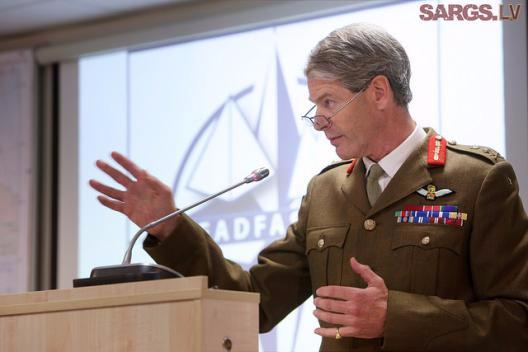 Fake news, cyberhacks and political coercion by Russia could be deemed acts of aggression by Nato, the top British officer in the alliance has indicated.
Fake news, cyberhacks and political coercion by Russia could be deemed acts of aggression by Nato, the top British officer in the alliance has indicated.
General Sir Adrian Bradshaw’s observation could signal an expansion in the interpretation of Article 5 of the Nato charter, in which an attack on one member state is an attack on all.
Asked whether disinformation and meddling, such as Russia’s alleged interference in the US election, was an Article 5 area, General Bradshaw said: “Well Article 5 is when it’s declared to be Article 5 . . . It is a political decision, but no, it is not out of the question that aggression, blatant aggression, in a domain other than conventional warfare might be deemed to be Article 5….”
General Bradshaw said that Nato could not tackle ambiguous warfare alone. Instead, it must work more closely with the EU and governments, coordinating its military force with civilian-led efforts in the diplomatic, political, economic and information domains, he said. Failure to respond would increase the risk of military conflict, he added.
“This is not just about military deterrence. What we require is hybrid deterrence,” General Bradshaw said at Nato’s headquarters in Mons, Belgium. “We require the ability to defend our vital assets from aggression in any area….”
General Bradshaw, who is due to step down from his post this month, helped to oversee a transformation within Nato as it refocuses on defending its eastern flank from Russian aggression instead of the conflict in Afghanistan. The most high-profile element of this effort will be the deployment of 4,000 British and other Nato soldiers to the Baltic states and Poland in the coming weeks. The military build-up — a fraction of the force of tens of thousands on the Russian side of the border — is designed to send a message to Moscow.
“Do not mess with Nato,” the general said. “You set foot in one of these countries . . . you’re taking on Nato with all that that implies . . . so woe betide a nation that does that.”
Image: Deputy Supreme Allied Commander Europe General Sir Adrian Bradshaw, Sept. 18, 2015 (photo: Gatis Dieziņš/Army of Latvia)
